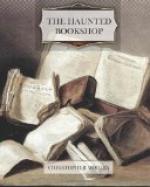“Queer again,” he thought. “Carlyle’s Oliver Cromwell! I looked for that book last night and couldn’t find it. When that professor fellow was here. Maybe I’m tired and can’t see straight. I’ll go to bed.”
The next day was a date of some moment. Not only was it Thanksgiving Day, with the November meeting of the Corn Cob Club scheduled for that evening, but Mrs. Mifflin had promised to get home from Boston in time to bake a chocolate cake for the booksellers. It was said that some of the members of the club were faithful in attendance more by reason of Mrs. Mifflin’s chocolate cake, and the cask of cider that her brother Andrew McGill sent down from the Sabine Farm every autumn, than on account of the bookish conversation.
Roger spent the morning in doing a little housecleaning, in preparation for his wife’s return. He was a trifle abashed to find how many mingled crumbs and tobacco cinders had accumulated on the dining-room rug. He cooked himself a modest lunch of lamb chops and baked potatoes, and was pleased by an epigram concerning food that came into his mind. “It’s not the food you dream about that matters,” he said to himself; “it’s the vittles that walk right in and become a member of the family.” He felt that this needed a little polishing and rephrasing, but that there was a germ of wit in it. He had a habit of encountering ideas at his solitary meals.
After this, he was busy at the sink scrubbing the dishes, when he was surprised by feeling two very competent arms surround him, and a pink gingham apron was thrown over his head. “Mifflin,” said his wife, “how many times have I told you to put on an apron when you wash up!”
They greeted each other with the hearty, affectionate simplicity of those congenially wedded in middle age. Helen Mifflin was a buxom, healthy creature, rich in good sense and good humour, well nourished both in mind and body. She kissed Roger’s bald head, tied the apron around his shrimpish person, and sat down on a kitchen chair to watch him finish wiping the china. Her cheeks were cool and ruddy from the keen air, her face lit with the tranquil satisfaction of those who have sojourned in the comfortable city of Boston.
“Well, my dear,” said Roger, “this makes it a real Thanksgiving. You look as plump and full of matter as The Home Book of Verse.”
“I’ve had a stunning time,” she said, patting Bock who stood at her knee, imbibing the familiar and mysterious fragrance by which dogs identify their human friends. “I haven’t even heard of a book for three weeks. I did stop in at the Old Angle Book Shop yesterday, just to say hullo to Joe Jillings. He says all booksellers are crazy, but that you are the craziest of the lot. He wants to know if you’re bankrupt yet.”
Roger’s slate-blue eyes twinkled. He hung up a cup in the china closet and lit his pipe before replying.
“What did you say?”




